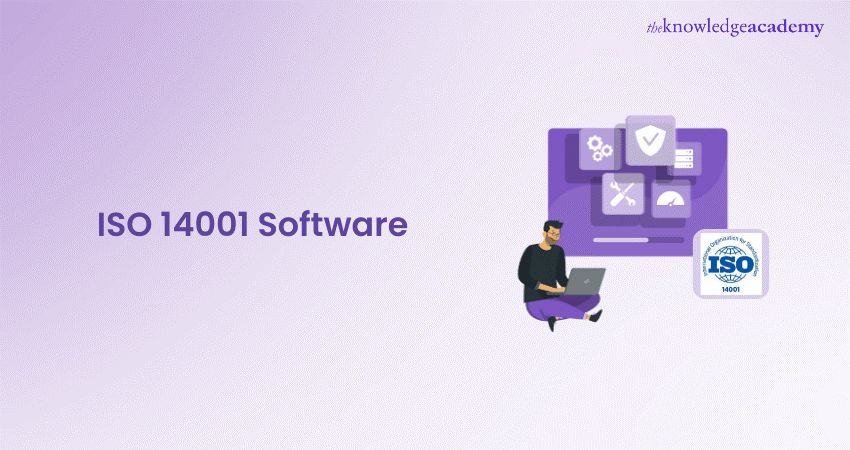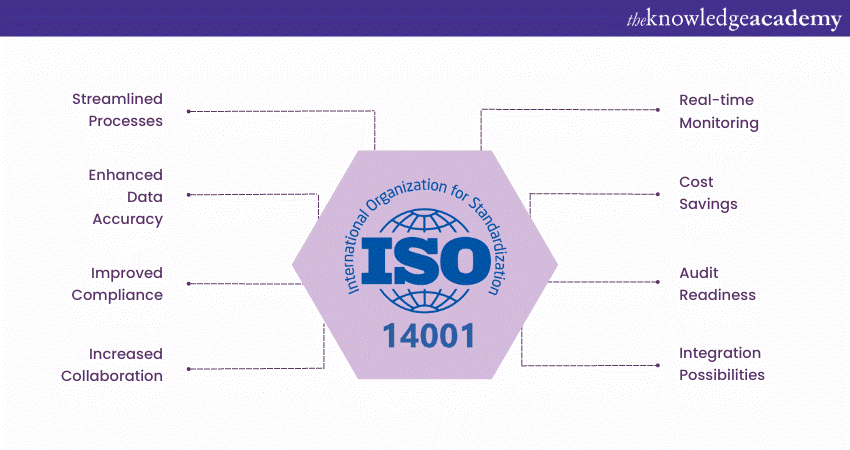We may not have the course you’re looking for. If you enquire or give us a call on +44 1344 203 999 and speak to our training experts, we may still be able to help with your training requirements.
We ensure quality, budget-alignment, and timely delivery by our expert instructors.

In today’s increasingly environmentally conscious world, organisations are recognising the importance of adopting sustainable practices and effectively managing their environmental impacts. However, implementing and maintaining with the right Environmental Management standards can be complex and time-consuming. This is where ISO 14001 Software comes into play.
Whether you are a small business or a large enterprise, ISO 14001 Software can help you easily navigate the complex landscape of Environmental Management. But what is this software, how can it help an organisation, and what are its benefits?
Read this blog to learn about the ISO 14001 Software tools. Also, explore their key features and benefits of reducing environmental compliance difficulties.
Table of Contents
1) What is ISO 14001 Software?
2) How to Plan for ISO 14001?
3) Key Features of ISO 14001 Software
4) Benefits of Implementing ISO 14001 Software
5) Conclusion
What is ISO 14001 Software?
ISO 14001 software is a comprehensive digital tool developed to assist organisations in implementing, managing, and maintaining an Environmental Management System (EMS) that aligns with the ISO 14001 standard. This international standard guides organisation to improve environmental performance, reduce risks, and comply with regulations.
The software facilitates various tasks, including document management, risk assessment, compliance tracking, and performance reporting. This makes the process of achieving and sustaining ISO 14001 Certification more streamlined and efficient.
How to Plan for ISO 14001 Certification?
Organisations can thoroughly plan ahead in time for their ISO 14001 Certification, by ensuring that they comply with the following checkpoints in the list below:
a) Purchase an official copy of the ISO 14001 guidelines or checklist and extensively research and learn about how the regulations will apply to your organisation.
b) Establish a structure of Leadership for your organisation’s EMS.
c) Craft a well-detailed plan that covers all the necessary aspects of your project, which should ideally include the remaining points highlighted in this list.
d) Discuss and narrow down the geographical locations impacted and the formal scope of your project, by your organisation’s potential EMS.
e) Conduct a session to review your organisation’s environmental compliance and determine your project’s environmental aspects.
f) Recognise the necessary regulations applicable to your organisation and other important requirements related to your environmental aspects.
g) Create the necessary controls and implement them for your organisation’s environmental aspects, thereby ensuring that they fulfil the requirements of the applicable regulations.
h) Formally assess a Compliance assessment session against all legal and other important requirements.
i) Decide and formalise the required environmental objectives and any associated action plans.
j) Complete the internal audit for your organisation.
k) Fix a schedule for your organisation’s stage one and stage two parts of the ISO 14001 assessments with your selected Certification Body or CB.
Make a positive impact on your organisation’s environmental performance. Register for our ISO 14001 Foundation Certification Course now!
Key Features of ISO 14001 Software
When searching for an ISO 14001 Software solution, it’s important to consider various features that can help your organisation achieve and maintain compliance. Here are some key features to look for:
Document Control
A robust ISO 14001 software should offer comprehensive ISO 14001 Document Control capabilities, providing a centralised repository for managing environmental documentation. This includes the efficient creation, revision, and approval of policies, procedures, work instructions, and other essential documents. Features like version control, access restrictions, and document tracking ensure the integrity and accessibility of your environmental documentation.
Risk Assessment
Effective environmental management requires identifying, assessing, and mitigating environmental risks and opportunities. The software should facilitate the systematic identification and evaluation of environmental aspects, helping organisations understand their environmental impacts. This streamlines the risk assessment process, allowing for the prioritisation of actions, implementation of controls, and monitoring of risk mitigation strategies.
Performance Monitoring
The software must also empower organisations to monitor and measure their environmental performance effectively. It should enable tracking of the Key Performance Indicators (KPIs) and provide real-time dashboards and reports to visualise environmental data. This feature will allow organisations to continually identify trends, benchmark performance, and make informed decisions to improve their Environmental Management efforts.
Audit Management
Internal and external ISO 14001 audits are essential for evaluating and verifying an organisation’s compliance with ISO 14001 and identifying areas for improvement. Therefore, choose a 14001 Software that streamlines the audit management process by facilitating audit planning, scheduling, execution, and tracking of audit findings.
Corrective Action Management
When non-conformities or environmental incidents occur, the software should provide a structured framework for managing corrective actions. It should enable organisations to capture and track non-conformances, assign responsibilities, set deadlines, and monitor the progress of corrective actions. This ensures timely resolution of issues, promotes continuous improvement, and helps maintain compliance with ISO 14001 requirements
Reporting And Analytics
Environmental Management solutions must offer powerful reporting and analytics capabilities, allowing organisations to generate comprehensive environmental reports. It should also provide customisable reporting templates, data visualisation tools, and advanced analytics features.
This will enable organisations to analyse trends, identify areas for improvement, and demonstrate their environmental performance to Stakeholders, regulatory authorities, and certification bodies.
Integration Capability
A software tool must be designed to integrate seamlessly with other management systems, such as ISO 9001 for Quality Management or ISO 45001 for Occupational Health and Safety. Integration streamlines processes, eliminates duplication of efforts, and facilitates a holistic approach to sustainability and compliance. Therefore, organisations can achieve synergies by leveraging the interconnectivity between different management systems and improving overall operational efficiency.
Implementing software solutions for
Elevate your Environmental Management expertise with our comprehensive ISO 14001 Compliance - join now!
Benefits of Implementing ISO 14001 Software
Implementing software solutions for ISO 14001 Compliance offers organisations numerous benefits, including the following:

a) Streamlined Processes: Software solutions automate and streamline Environmental Management processes, reducing manual efforts and increasing operational efficiency.
b) Enhanced Data Accuracy: By centralising environmental data and automating data collection, software solutions ensure accurate and reliable information for informed Decision-making.
c) Improved Compliance: These solutions facilitate compliance with ISO 14001 requirements, ensuring organisations effectively meet environmental standards and regulations.
d) Increased Collaboration: Collaboration features within software solutions enable Effective Communication and engagement across teams, promoting a culture of environmental responsibility.
e) Real-time Monitoring: Software solutions provide real-time monitoring and reporting capabilities, allowing organisations to track KPIs and identify areas for improvement promptly.
f) Cost Savings: By optimising resource usage, reducing waste, and minimising the risk of environmental incidents, organisations help achieve cost savings and improve sustainability.
g) Audit Readiness: With comprehensive audit management features, software solutions enable organisations to be well-prepared for internal and external audits, ensuring compliance and prompt corrective actions.
h) Integration Possibilities: The solutions can also integrate with other management systems, providing a holistic approach to sustainability and aligning environmental efforts with quality and health and safety management.
Become a trusted leader in environmental auditing. Register for our ISO 14001 Lead Auditor Course now!
Conclusion
Implementing ISO 14001 Software for 14001 compliance offers organisations a powerful means to streamline their Environmental Management efforts and drive sustainability considering the ISO 14001 Context of the Organisation By choosing the right software solution and implementing best practices, organisations can unlock the full potential of ISO 14001 and pave the way towards a greener and more sustainable future.
Advance your career with our ISO 14001 Course and master essential environmental management skills!
Frequently Asked Questions
Who Should Adopt ISO 14001?

ISO 14001 should be adopted by any organisation aiming to improve environmental performance and ensure regulatory compliance. It is also suitable for those demonstrating a commitment to sustainability, regardless of size or industry.
How Often Does ISO 14001 Need to be Updated or Renewed?

ISO 14001 should be reviewed annually to ensure ongoing compliance and effectiveness. Certification generally lasts for three years, with periodic surveillance audits required to maintain it and confirm continued adherence to the standard.
What are the Other Resources and Offers Provided by The Knowledge Academy?

The Knowledge Academy takes global learning to new heights, offering over 30,000 online courses across 490+ locations in 220 countries. This expansive reach ensures accessibility and convenience for learners worldwide.
Alongside our diverse Online Course Catalogue, encompassing 19 major categories, we go the extra mile by providing a plethora of free educational Online Resources like News updates, Blogs, videos, webinars, and interview questions. Tailoring learning experiences further, professionals can maximise value with customisable Course Bundles of TKA.
What is The Knowledge Pass, and How Does it Work?

The Knowledge Academy’s Knowledge Pass, a prepaid voucher, adds another layer of flexibility, allowing course bookings over a 12-month period. Join us on a journey where education knows no bounds.
What are the Related Courses and Blogs Provided by The Knowledge Academy?

The Knowledge Academy offers various ISO 14001 Certification, including ISO 14001 Foundation Certification, ISO 14001 Lead Auditor Course, ISO 14001 Internal Auditor Training and ISO 14001 Lead Implementer Course. These courses cater to different skill levels, providing comprehensive insights into Environmental Management System (EMS).
Our Health & Safety Blogs cover a range of topics related to ISO 14001, offering valuable resources, best practices, and industry insights. Whether you are a beginner or looking to advance your Health and Safety skills, The Knowledge Academy's diverse courses and informative blogs have got you covered.
Upcoming Health & Safety Resources Batches & Dates
Date
 ISO 14001 Foundation Certification
ISO 14001 Foundation Certification
Mon 7th Apr 2025
Mon 4th Aug 2025
Mon 3rd Nov 2025






 Top Rated Course
Top Rated Course



 If you wish to make any changes to your course, please
If you wish to make any changes to your course, please


